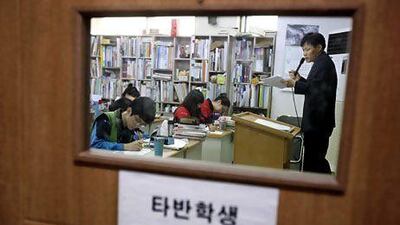South Korea is a country whose key resource is its people. It makes sure they are highly educated and the result has been an economic transformation. Suh Nam-pyo writes
In a mere four decades, South Korea, a country without any natural resources except human ones, has become a major industrial and economic power.
It is a leading producer of wireless telephones, displays, desalination plants, cars, ships, steel, electronic products and semiconductors. Its per capita income in terms of purchasing power parity is greater than that of the European Union as a whole.
The rapid economic and technological transformation of the country has been possible because of its highly competitive educational system. Korean families invest a large portion of their income in education, including private tutoring for their children. South Korea's overall investment, public and private, in education is among the world's highest. It is these educated human resources that have enabled the nation to become a leading technological nation.
The educational system, as in other developed nations, is made up of primary, secondary, and tertiary systems. There are about 1,300 high schools and about 300 universities and colleges. About 80 per cent of high school graduates go to universities and colleges, one of the highest rates in the world.
The country's secondary educational system is unique because in addition to its general high schools, South Korea has special high schools. For example, its science high schools, about 20 in number, are designed for students who show special aptitude for mathematics, science, and engineering. There are also four high schools for students gifted in science and art. These competitive special-purpose high schools generate about 2,400 graduates a year, each school producing about 100 graduates each year.
At the tertiary level, the country has special research universities for science and technology, the primary one being the Korea Advanced Institute of Science and Technology (Kaist). Fewer than 1 per cent of high school graduates can qualify for admittance to Kaist, a statistic that illustrates the highly selective admission process of elite universities.
Kaist represents an interesting case study of how to develop a research university. It was founded in 1971 to generate engineers and scientists with master's degrees and doctorates. Its creation coincided with the decision of the government under the then president Park Chung-hee to invest in heavy industries such as steel-making, shipbuilding, machine tools, and automobiles.
Until then, the economy had depended heavily on labour-intensive businesses. Since its establishment, Kaist has produced about 46,000 graduates including about 9,000 Phd graduates. It has about 620 tenure-track professors and a further 400 or so adjunct or visiting professors. Today Kaist's overall ranking in the world is around 63rd; in engineering and information technology, it ranks 24th. Of course, Kaist is rated as the best university in South Korea.
Of the top 10 research universities eight are private; the exceptions are Kaist and Seoul National University. Even in the United States, most top research universities are private. Unlike South Korea, many countries that have primarily public universities do not seem to have top research universities.
Although South Korea has a strong educational system, there is still room for improvement. For instance, its educational system is teacher-centric rather than learner-centric, tending to emphasise rote learning. And the Korean parents spend too much money for private tutoring, which teaches students advanced topics before they have learnt them in public schools so that they can become more competitive in gaining admission to leading universities.
The Korean educational system needs to make students more creative by giving them more time for independent learning, by letting students find problems and solve them on their own, and by promoting the culture of raising questions in classrooms.
Education is becoming global. With the availability of information on the internet and with many university-level lectures stored online, education has now become a global enterprise. In tandem with the trend, Kaist has initiated an educational programme, Education 3.0 (also known as the I-4 programme). Under this format, no lectures are given in the classroom.
Students listen on their own to lectures stored on the internet and go to class to solve problems with other students in a pre-assigned group. Student response to Education 3.0 has been overwhelmingly positive, and Kaist is expanding this programme. Kaist is also broadening this way of learning by collaborating with universities in other countries. We initiated the Kaist International Education Initiative in which its students learn with their counterparts at the Technical University of Denmark through cyber space, using the internet and other tools.
Kaist is one of South Korea's front-runners in establishing a partnership with its counterpart in the UAE. The case in point is its strong interactions with Khalifa University that have developed for the past five years. In particular, Kaist cooperated with Khalifa University for the latter's establishment of a nuclear engineering programme by sending Kaist professors to the UAE. The two universities have also collaborated in joint research projects. Khalifa students come to Kaist for short-term and long-term study visits.
Over the next two decades, education, which has become the engine for economic development around the world, is likely to undergo major transformations with the continued advance of information and communications technology.
The challenges facing South Korea and the UAE seem to me more or less identical, that is, those of making it more effective, less costly, and learner-centric.
Suh Nam-Pyo, a former president of Korea Advanced Institute for Science and Technology (Kaist), is the Ralph E& Eloise F Cross professor, Emeritus, MIT. This is the first in a series of two-part articles written exclusively for The National

